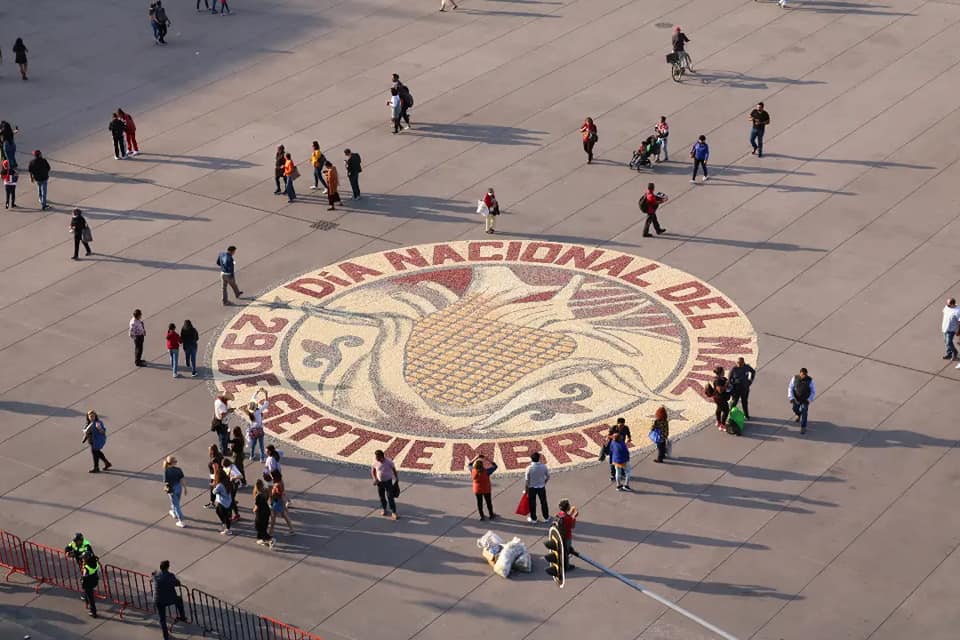Since 2020 the U.S. government, under the influence of the agribusiness lobby, has been bullying the Mexican government to reverse a Presidential decree banning the importation of GMO corn, and glyphosate.
In December of 2020, the Mexican President signed a presidential decree banning the further importation of GMO corn, and the toxic pesticide glyphosate. According to the decree, Mexico would gradually phase out glyphosate, and any agrichemical containing glyphosate, and seek the total replacement of GM corn used in foods by January 31, 2024. Mexico is one of the cradles of corn biodiversity, and since the signing of NAFTA in 1994, has been the primary importer of genetically modified corn coming from the US.
The decree, founded on the precautionary principle, human rights, and with the objective of reaching greater sustainability and food sovereignty within one of the world’s biodiversity hotspots, has caused uproar among United States agribusiness interests. Over the last 10 years, the Mexican market for corn importation has increased an astounding 179%, with 2022 seeing the largest importation of 15.4 million metric tons, worth $4.92 billion. Over 90% of the corn planted in the US is genetically modified, and hence heavily doused with toxic pesticides which make their way into Mexico’s food supply. A food supply which is heavily dependent on traditional foods made primarily from corn flour.

Photo by Lindsay Eyink, under the Creative Commons Attribution 2.0 Generic license.
But regardless of the health concerns, representatives from CropLife, one of the largest agribusiness lobby groups, and Bayer-Monsanto have solicited the intervention by US government agencies to stop the Mexican decree from coming into effect. In emails exchanged between CropLife, the US Environmental Protection Agency, and the Office of US Trade Representatives, CropLife warns that if the decree is allowed to stand it will open the door for greater applications of the precautionary principle throughout the Western Hemisphere, and as a result would severely jeopardize US agricultural profits. Essentially waving away any environmental or health concern raised by the Mexican government for the sake of agribusiness’ bottom line. The letter also prompts US government officials to use clauses within the USMCA (US-Mexico-Canada Trade Agreement), and the WTO Agreements on Technical Barriers to Trade, to file legal action against the Mexican government. Now working in tandem with the agribusiness lobby, the US and Mexico have been in dispute over the decree since its issuance.
The US has also demanded to know the scientific justification for the Mexican ban with U.S. Agricultural Trade Chief, Doug McKalip, saying that science should be driving Mexico’s policy decisions. Also stating, „We want to make sure that they do the science, show their work, and make decisions based upon risk assessments.“ An ironic and paternalistic statement considering the vast scientific evidence of the dangers of pesticides to human health. The WHO has also cited glyphosate as a possible carcinogen, along with the International Agency for Research on Cancer (IARC). Also shown by the Glyphosate Anthology, compiled by Argentinian Environmental Lawyers organization, Naturaleza de Derechos, there exists over 830 different scientific articles on glyphosates impact on health. As evidenced by the Monsanto Papers, Monsanto knew for decades about the carcinogenic nature of glyphosate. Glyphosate and other pesticides have also been linked to their detrimental effects on pollinator populations.
Concurrent to these trade disputes, Bayer-Monsanto has been globally under fire as victims who developed cancer due to exposure to glyphosate have been seeking legal action against the company. In the US, Monsanto (now Bayer-Monsanto) has been forced to settle over 100,000 lawsuits, made against Roundup, the original glyphosate-based agrichemical, and payed out over $11 billion USD to victims who have developed Non-Hodgkin lymphoma due to the pesticide. There are still 30,000 cases pending against the company. Chile saw a similar legal dispute against Bayer-Monsanto in 2019 where the Organization for Consumers in Chile won suit against the company with the 22nd Civil Court in Santiago citing evidence for a slow carcinogenic poisoning being caused by exposure. Glyphosate is also the most widely used agrichemical in Mexico, with 100% of its importation coming from the US and China.
It’s important to note that genetically modified crops and pesticides such as glyphosate go hand in hand, as GM crops are made to be resistant to an ever increasing load of pesticides. Environmental and health risks of GM crops are due to the entire agrichemical and industrial process that inherently comes attached to them, including high amounts of pesticide residues.
Mexico is the center of origin for the world’s corn and the largest reservoir of native corn varieties. Even though Mexico has historically not allowed the planting of GMO corn in the country, and primarily uses non-GMO varieties in the making of tortillas, masa and other traditional foods, illegal planting and genetic contamination have still been found in the country. Bayer-Monsanto has been pushing since the development of GM corn for Mexico to authorize its use. The presidential decree came as an attempted safeguard against further genetic contamination of Mexico’s biodiversity heritage. Transgenic corn can cause genetic contamination of landrace varieties through cross pollination, and has historically caused the mass genetic erosion of agro-biodiveristy in places where it has been allowed. Mexico’s corn varieties are a product of thousands of years of farmer’s patience, work and careful selection, with varieties having been chosen for their nutritional value, disease resistance and adaptation to a large variety of ecosystems. Further genetic erosion and biodiversity contamination would continue to be a detrimental loss for the world, as the genetic reservoir is essential to continuing global production of corn.
Regardless of US pressures, the Mexican government has remained firm in its banning of glyphosate, but after trade talks, Mexico amended the 2020 decree with a new presidential decree on February 13, 2023. The new decree softens the import ban on GM corn, allowing for its use in animal feed and industrial products, while maintaining the ban in its use for human consumption. The strong-arming of Mexico by the US agribusiness lobby and their co-opted government representatives is a violation of Mexico’s national sovereignty, and of the Mexican government’s obligations to protect the health of its people, its priceless agriculture biodiversity heritage, and its food sovereignty. It is a violation of the international agreements signed by Mexico, including the Cartagena Protocol on Biosafety.

Photo: Navdanya
In response to the disputes, earlier this month an open letter was issued by the Diverse Women for Diversity Movement, condemning the bullying of the US to force the importation of GMO corn. Women from all over the world signed the letter demanding that governments:
- Stop this strategy of pressuring the Government of Mexico to accept GMO corn. Mexico is the genetic reservoir of maize globally, which we must preserve.
- Recognize and accept the policy decisions democratically adopted by a sovereign country
- Acknowledge that the policies of Mexico are based on solid international scientific evidence demonstrating the harmful impacts of GMOs and glyphosate on human and environmental health.
- Recognize that the biodiversity of maize in Mexico is essential to food sovereignty not only in Mexico, but globally. No GMO should be introduced into any country, especially if it is a center of diversity.
Read and support the Open Letter from Diverse Women for Diversity to World Leaders

